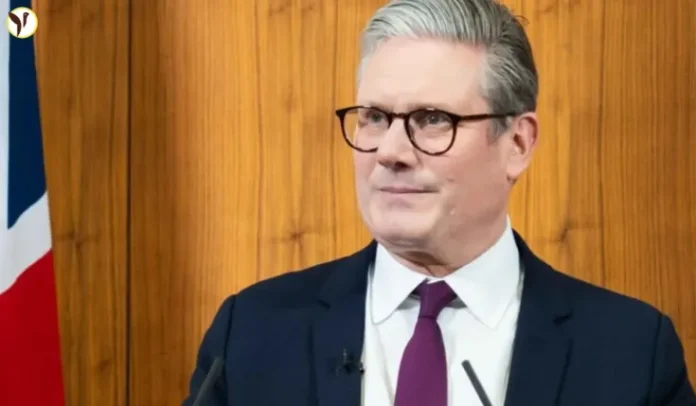On May 12, 2025, Prime Minister Sir Keir Starmer unveiled a sweeping set of reforms to the UK immigration rules, promising a “significant” cut in net migration. Speaking in Downing Street, he declared, “New proposals will lead to significant immigration cut,” vowing to fix a “broken” system that saw net migration soar to 906,000 in June 2023. The announcement, detailed in the Immigration White Paper, responds to public frustration and political pressure, particularly after Reform UK’s recent local election gains. Starmer’s plan tightens visa requirements, raises English language standards, and extends settlement periods, aiming to create a “controlled, selective, and fair” framework. But can Labour deliver on this ambitious pledge? Let’s dive into the details, explore the changes, and weigh the potential impacts.
Read Also-UK Childcare Funding Expansion: A Game-Changer for Working Parents
UK Immigration Rules: What’s Changing?
The new UK immigration rules introduce several headline-grabbing measures. First, the skilled worker visa threshold returns to degree-level qualifications, reversing Boris Johnson’s A-level equivalent policy. This shift could block around 180 job roles, potentially reducing migration by 39,000 annually by 2029. Second, English language tests now apply to all visa applicants and their adult dependants, a move Starmer says promotes integration but critics warn may split families. Third, most migrants must now wait 10 years—double the previous five—before applying for settled status, though nurses, engineers, and AI experts can fast-track if they “contribute to Britain’s growth.”
Here’s a quick breakdown:
| Policy | Details | Estimated Impact |
|---|---|---|
| Skilled Visa Threshold | Degree-level required | 39,000 fewer migrants by 2029 |
| English Tests | Mandatory for all, including dependants | Integration boost, but family concerns |
| Settlement Period | 10 years, with fast-track for key roles | Tighter control, more restrictive globally |
| Care Worker Visas | Scrapped for new overseas hires | 7,000–8,000 fewer workers annually |
The Home Office projects a 100,000 annual drop in immigration by 2029, but the lack of a specific target has sparked skepticism.
Why Now? The Politics Behind UK Immigration Rules
Starmer’s reforms come at a critical moment. Net migration, which hit 728,000 in June 2024, has strained housing and public services, fueling voter discontent. Reform UK’s Nigel Farage, capitalizing on this, called Starmer’s promises “unkeepable” and demanded withdrawal from the European Convention on Human Rights. Meanwhile, Conservative leader Kemi Badenoch dismissed the plans as “nowhere near enough,” accusing Labour of flip-flopping on policies they once opposed. Starmer insists this isn’t a reaction to Reform’s surge but a long-planned fix for a system he claims has done “incalculable” economic and political damage.
The Prime Minister’s rhetoric—warning against an “island of strangers”—strikes a populist chord, but he’s walking a tightrope. Labour’s base includes pro-immigration voters, and former leader Jeremy Corbyn blasted the plans, arguing economic woes stem from corporate greed, not migrants. The Green Party’s Carla Denyer called the reforms “panicked and misguided,” warning of harm to the care sector.
The Impact: Winners and Losers
The tightened UK immigration rules will reshape industries and communities. The care sector, already grappling with 152,000 vacancies, faces a crisis. Scrapping overseas care worker visas could cut 7,000–8,000 arrivals yearly, but care home bosses warn of “significant problems” without domestic recruitment solutions. Martin Green of Care England called it a “crushing blow,” urging investment in local training. Universities, hit by a proposed levy on international student fees, fear reduced global competitiveness, with Vivienne Stern of Universities UK sounding the alarm.
On the flip side, Starmer argues the rules will force businesses to train British workers, ending an “addiction” to cheap overseas labor. The Immigration Skills Charge, up 32% to £2,400–£6,600 per sponsored worker, aims to deter foreign hires. But the Confederation of British Industry (CBI) disputes claims of overreliance, warning of economic fallout if skills gaps persist.
Can Starmer Deliver?
The promise of a “significant” migration cut is bold, but history casts a long shadow. David Cameron’s 2010 pledge to reduce net migration to “tens of thousands” failed spectacularly, and Rishi Sunak’s “Stop the Boats” mantra didn’t halt Channel crossings. Starmer avoids specific targets, arguing they’ve “consistently failed,” but this vagueness invites scrutiny. Will net migration fall every year? “Significantly,” he repeats, dodging a firm timeline.
Enforcement is another hurdle. Since July 2024, Labour has deported 24,000 people with no right to stay—the highest rate in eight years. Yet, small boat crossings, untouched by these reforms, continue to rise, with 10,000 projected this spring. Starmer’s plan hinges on linking immigration to the labor market, with a new Labour Market Evidence Group to address skills shortages. But implementation, delayed until 2026 for some measures due to legislative hurdles, could falter if public services or businesses buckle under pressure.
Looking Ahead: A Nation Divided?
As the dust settles on Starmer’s announcement, the debate over UK immigration rules intensifies. Supporters see a pragmatic step toward control, aligning migration with economic needs. Critics, from care providers to refugee charities, fear unintended consequences—staff shortages, family separations, and weakened universities. The Liberal Democrats’ Lisa Smart urged scrutiny to ensure economic balance, while the SNP’s Pete Wishart slammed the plans as a “devastating attack” on Scotland’s NHS and economy.
Starmer’s vision of a “nation that walks forward together” is compelling, but the road is fraught. Public trust, battered by decades of broken promises, hangs in the balance. Will these reforms restore confidence or deepen divides? Only time will tell, but one thing’s clear: immigration remains a lightning rod, and Starmer’s gamble will define his premiership. Stay tuned as the Home Office rolls out details and Parliament debates the White Paper. What do you think—can Labour pull this off?
